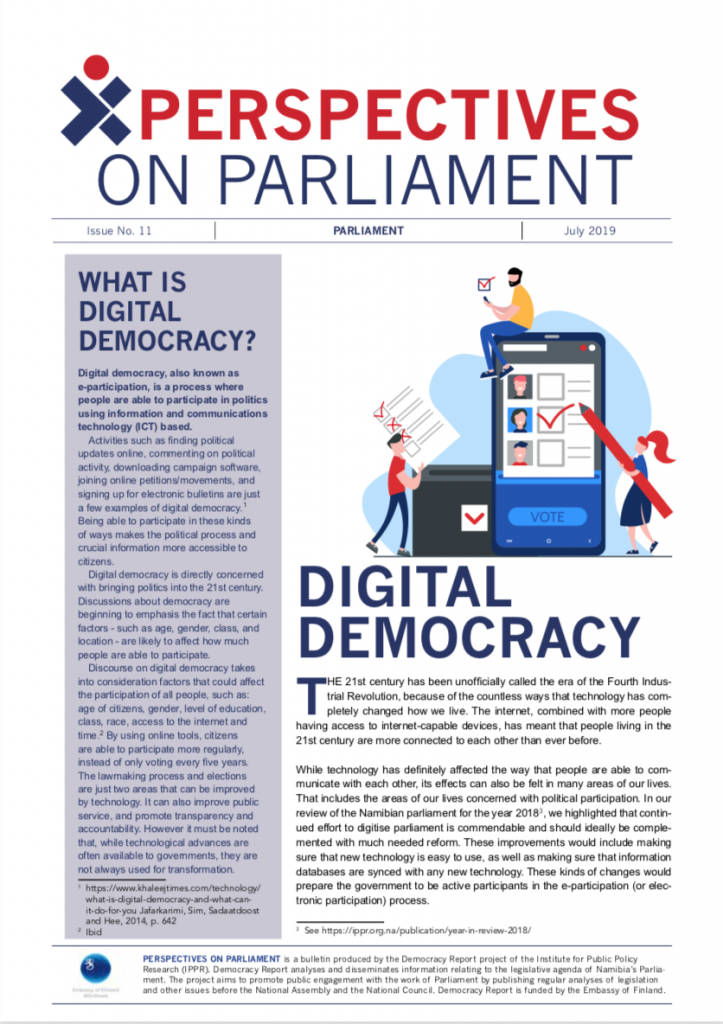Digital Democracy

While technology has definitely affected the way that people are able to communicate with each other, its effects can also be felt in many areas of our lives. That includes the areas of our lives concerned with political participation. In our review of the Namibian parliament for the year 2018, we highlighted that continued effort to digitise parliament is commendable and should ideally be complemented with much needed reform. These improvements would include making sure that new technology is easy to use, as well as making sure that information databases are synced with any new technology. These kinds of changes would prepare the government to be active participants in the e-participation (or electronic participation) process.
How to Participate in Government

There are three branches of government: the legislative (parliament), the judiciary (courts) and the executive (parliament). The constitution is the supreme law of the country, which contains principles that keep the branches of government from interfering with each other, as each branch is meant to function independently of the other.
The public can participate in some of the actions of these branches, but only up to a certain point. Firstly, of course, Namibian citizens have a constitutional right to vote in National Elections every five years, and therefore choose the members of the National Assembly. In this way, they are able to influence the composition of the legislature and the executive, as Cabinet members are traditionally chosen from the National Assembly.
Public procurement lacks transparency
The latest issue of the Procurement Tracker, an quarterly initiative launched in 2018 by the Institute of Public Policy Research (IPPR) to monitor and track developments and issues within the Namibian public procurement sphere, states that successive reviews of the procurement systems in place and the body managing the processes “suggest a system in trouble and even in turmoil.”
Shift Focus from Housing to Tenure
An urgent reframing on the way the authorities are addressing the issue of housing in order to address informal settlement growth is needed.
In a review published by John Mendelsohn of Raison on the recently published results of a study on the supply of land and homes to low-income residents by the Institute of Public Policy Research (IPPR), the author highlights that discussions on the crucial topic need to shift focus, especially when it comes to the “pervasive use of the term housing.”
Consider the Environment in Town Planning and Housing Developments – IPPR
Edgar Brandt Windhoek-Government, including regional and local authorities, needs to ensure that urban building standards and town planning regulations enable and incentivise integrated, flexible, cost-effective and sustainable housing developments. This is according to a report released this week by the Institute for Public Policy Research (IPPR), titled ‘Housing in Namibia: Rights, Challenges and Opportunities’. The report, compiled by IPPR research associates, Pauline Ndhlovu and Dietrich Remmert, recommends clear certification processes and concise regulations in place to promote the use of alternative construction materials and methods.
Gaps in the Human Trafficking Bill
Government’s efforts to finalise a combating of trafficking in persons law, in line with its stated objective to improve efforts to combat human trafficking in Namibia, is a step in the right direction.
The latest issue of ‘Perspectives on Parliament’, a regular bulletin by the Democracy project of the Institute of Public Policy (IPPR) noted that “despite its shortcomings, the Bill represents a step forward in fighting human trafficking in Namibia”.
Housing Crisis – IPPR Calls for a National Integrated Spatial Planning Framework
The Institute of Public Policy Research (IPPR) called on government to develop a national integrated spatial planning framework, coupled with the devolution of specific town planning powers to lower levels of government.
According to IPPR this would present an extraordinary opportunity to review and restructure the existing regulatory framework around housing and urban land.
This was highlighted in a IPPR recently published a report by its research associates, Dietrich Remmert and Pauline Ndhlovu: ‘Housing in Namibia- Rights, Challenges and Opportunities’ which takes a look at the surrounding issues and inefficiencies in the way of affordable and adequate housing for the majority of Namibia.
Access to Information is a Pervasive Local Problem, not only a Government Headache
Last year the IPPR sought to make an assessment of the state of access to information in Namibia. The principal means of doing this was by making a range of information requests to over 100 government bodies, public enterprises, private companies, and civil society organisations.
The issue of Access to Information was deemed appropriate because of the strong importance government attaches to making information available to the public, as expressed in the Harambee Prosperity Plan (HPP) and NDP5. For example, the HPP commits to providing the “means for access to public information/data and the enact(ing of) freedom of information laws by year two of Harambee” (2017/18).Complementing the HPP is NDP5, which in its executive summary states: “Good governance, responsive institutions and an engaged citizenry are the bedrock of democracy and sustainable development.”
The research report and its findings provide an opportunity for government and other sectors of Namibian society to identify weak points and best practices in the release of information and therefore move towards the NDP5 aim of “universal access to information”.
In the light of the above, it is disappointing that the Minister of Information and Communication Technology, Hon. Tjekero Tweya, chose to issue a blanket condemnation of the Access Denied report by claiming it was “devoid of any truth” and that IPPR has a “malicious agenda”.

